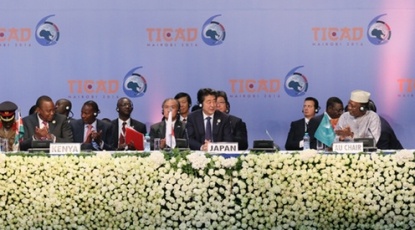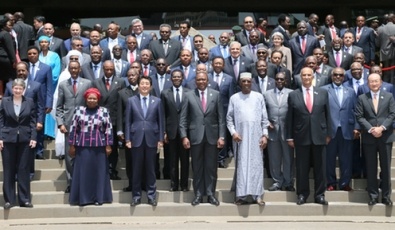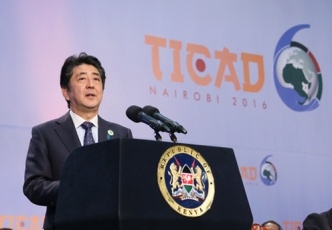Africa
Sixth Tokyo International Conference on African Development (TICAD VI)
August 28, 2016
 Photo: Cabinet Public Relations Office
Photo: Cabinet Public Relations Office
 Photo: Cabinet Public Relations Office
Photo: Cabinet Public Relations Office
 Photo: Cabinet Public Relations Office
Photo: Cabinet Public Relations Office
The Sixth Tokyo International Conference on African Development (TICAD VI) was held in Nairobi, the Republic of Kenya, on August 27 and 28. The overview is as follows. This TICAD was the first to be held in Africa. Mr. Shinzo Abe, Prime Minister, attended from Japan, and served as co-chair along with Mr. Uhuru Kenyatta, President of Kenya (the host country), and Mr. Idriss Deby Itno, President of the Republic of Chad (Chairperson of the African Union (AU)).
1 Attendees and schedule
(1) Attendees
Including side events within the venue, over 11,000 people participated in TICAD VI, including the representatives of 53 African countries as well as development partner countries and Asian countries, international and regional organizations, the private sector, and civil society such as nongovernmental organizations (NGOs). In addition, a business mission with leaders from 77 organizations including Japanese businesses and universities accompanied Prime Minister Abe and introduced Japanese private-sector initiatives at each session.(2) Schedule
Sat., August 27
Opening SessionPlenary Session 1 (General Debate)
Thematic Sessions
Theme 1: Promoting structural economic transformation through economic diversification and industrialization
Theme 2: Promoting resilient health systems for quality of life
Theme 3: Promoting social stability for shared prosperity
Sun., August 28
Plenary Session 2 (Dialogue with the Private Sector)Plenary Session 3 (Report from Each Thematic Session)
Closing Session
Joint Press Conference
2 Overview of the main sessions
(1)At the Opening Session, Prime Minister Abe announced that for a period of three years from 2016 to 2018, Japan will invest for the future of Africa through implementing measures centering on developing quality infrastructure, promoting resilient health systems and laying the foundations for peace and stability, amounting to approx. USD 30 billion under public-private partnership. These measures include human resource development to 10 million people ("Empowerment") by making use of the strength of Japan ("Quality"). Prime Minister Abe also explained that this commitment is the first step in putting this year's G7 Ise-Shima Summit outcomes into practice, and as the G7 president, Japan will steadily realize those outcomes.
(2)At Plenary Session 1, the leaders and other senior officials of African countries had active discussions on responding to the new challenges that Africa faces, such as declining international resources prices, Ebola virus disease outbreaks and the fragility of the health system, and threats to peace and stability. In addition, leaders of many countries mentioned the keynote address delivered by Prime Minister Abe and highly appreciated Japan's efforts.
(3)At the Thematic Sessions, active discussions were held on means for achieving the promotion of 1) economic diversification and industrialization; 2) resilient health systems; and 3) social stability, which are TICAD VI's priority areas. In all areas, appreciation and expectations were expressed for public-private initiatives that utilize Japan's strengths.
(5)At the Closing Session, the Nairobi Declaration was adopted as the TICAD VI outcome document.
(2)At Plenary Session 1, the leaders and other senior officials of African countries had active discussions on responding to the new challenges that Africa faces, such as declining international resources prices, Ebola virus disease outbreaks and the fragility of the health system, and threats to peace and stability. In addition, leaders of many countries mentioned the keynote address delivered by Prime Minister Abe and highly appreciated Japan's efforts.
(3)At the Thematic Sessions, active discussions were held on means for achieving the promotion of 1) economic diversification and industrialization; 2) resilient health systems; and 3) social stability, which are TICAD VI's priority areas. In all areas, appreciation and expectations were expressed for public-private initiatives that utilize Japan's strengths.
- At Thematic Session 1, transforming economic structures dependent on primary products was raised as a means of responding to declining international resources prices. Participants shared a view on the importance of investing in high quality infrastructure, including developing roads and ports and renewable energies (such as geothermal electric power generation), building food value chains, and developing industrial human resources.
- At Thematic Session 2, the two themes of strengthening responses to public health crises and Universal Health Coverage (UHC) were raised, and participants shared a view on the importance of strengthening each country's capacity to prevent, prepare for, and respond to crises alongside international efforts, and of promoting UHC in order to deal with the broad-ranging health issues that Africa faces.
- At Thematic Session 3, promoting social stability in order to respond to social instability and the increased risk of natural disasters arising from climate change were raised. Participants shared a view on the importance of issues such as employment generation through job training for women and youths, strengthening public security capabilities, disaster risk reduction and food safety security.
(5)At the Closing Session, the Nairobi Declaration was adopted as the TICAD VI outcome document.

